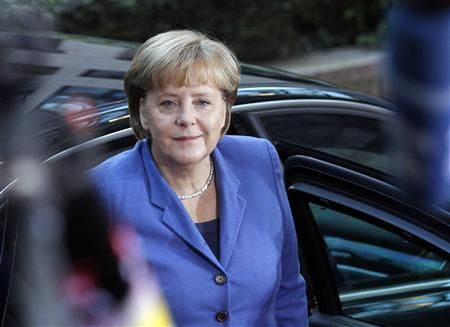Germany, France Come Closer to EFSF Leveraging Deal: Officials

France and Germany are close to a deal to leverage the euro zone bailout fund through first loss insurance for the primary bond market and a special purpose vehicle with an EFSF subordinated loan for the secondary market, euro zone officials said.
There is also wide support for a declaration from euro zone leaders which would welcome continued European Central Bank bond purchases on the secondary bond market, the officials said. The ECB has said it would prefer to take a back seat once the European Financial Stability Facility (EFSF) is fully functional with new powers.
There is broad backing for a declaration of euro zone leaders supporting continued ECB bond purchases, one euro zone official said.
France backed down on its demand to leverage the EFSF with the ECB, but insisted the ECB should still be somehow involved through its bond buying programme on the secondary market, a second euro zone official said.
The ECB would make very clear it will stay on the market, the second official said.
Separately, the 440 billion euro EFSF will seek to get more bang for its buck on the primary and secondary markets to turn investor sentiment back in favor of Italian and Spanish paper.
This, policymakers hope, would prevent the third and fourth largest euro zone economies from running into financing problems that could prove too big for the euro zone to handle.
There are only two models which are getting more detailed now. The first is the insurance scheme, the second is an SPV of the EFSF, into which third parties could pay in, a third euro zone source said.
In the end, a mixture of the two models could be decided on. Additionally the EU should talk with the IMF about further cooperation, the third official said.
The second official explained that the EFSF would guarantee the first 20-30 percent of losses investors might suffer if they bought the bonds of Italy or Spain at a primary auction and the sovereigns later defaulted.
To support the secondary market, the EFSF would create a special purpose vehicle (SPV) with private investors, sovereign wealth funds or other institutions, perhaps the International Monetary Fund, who would contribute paid-in capital.
With the twin measures, a two-tier bond market with primary issuance insured, and existing bonds not, would be avoided.
The EFSF would also commit to pay capital to the SPV through a subordinated loan.
Against this capital the new SPV would then borrow money on the market and use the cash to buy bonds of Italy or Spain on the secondary market.
In case of a default of one of the pair, the EFSF would be the first liable to cover the losses.
Euro zone officials cautioned however, that details of the scheme were still under discussion and could yet change -- for instance whether the EFSF should guarantee the SPV borrowing or the subordination of the loan was enough.
(Additional reporting by Jan Strupczewski and Ilona Wissenbach; writing by Jan Strupczewski, editing by Mike Peacock)
© Copyright Thomson Reuters 2024. All rights reserved.




















